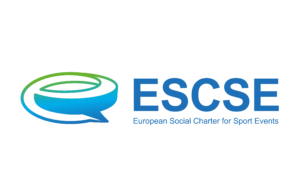
On the 23rd and 24th of May 2023, a follow-up meeting of the ESCSE project was organised in Paris with all the partners. The partners were delighted to be welcomed in the offices of the Organisational Committee for the Olympic and Paralympic Games of Paris 2024!

The purpose of this meeting was to agree on the content and amend the Charter in light of the discussions that had taken place. The result of these discussions is the final version of the Charter, which will enable us to embark on the final phase of the project: its dissemination. Some of the project partners have tested the current version of ESCSE, and this meeting was an opportunity for them to present their conclusions on the Charter.
It was essential to begin the discussions by clarifying the definitions. Primarily the definition of sports events’ stakeholders was specified to understand who is affected by each commitment. Then, the consortium subsequently refined all the commitments based on the feedback. The proposal to add indicators enabling organisers to assess the implementation of commitments has emerged. The development of these indicators was lengthy to come up with relevant ones. The partners then had to select and discuss which European Union and International Labour Organisation conventions should be included in the Charter to complete the recommendations. This work defined the acts corresponding to the different situations that sport event organisers must apply.
Another essential reflection took place on the topic of the dissemination strategy. There are three possible strategies for getting the Charter known and adopted by as many stakeholders as possible:
- Use the political route through an act of a European Union institution in order to give the text a broader influence.
- Turn to the rights holders who designate cities and countries to organise sporting events (e.g., IOC, UEFA).
- Approach major international sporting events on a one-off basis (at the margins).
The Charter aims to have a tangible impact on European sporting events. To achieve this, the rights holders must take it on board and make its application compulsory for the organisers of their events. In this way, the Charter could be included in their specifications for the designation of host territories. In addition and to facilitate dissemination, the Charter will be translated into the major languages of the European Union.
These implementation strategies are crucial for the follow-up of the project, as all partners have the ambition to encourage social responsibility in sports events and believe that sports can have a positive social impact.
